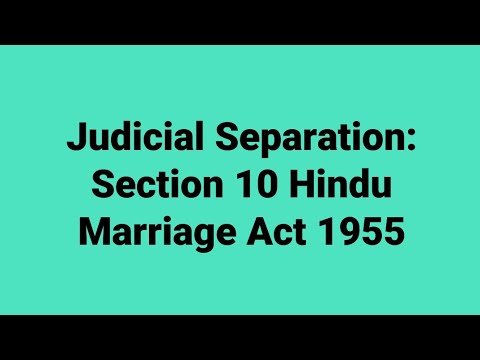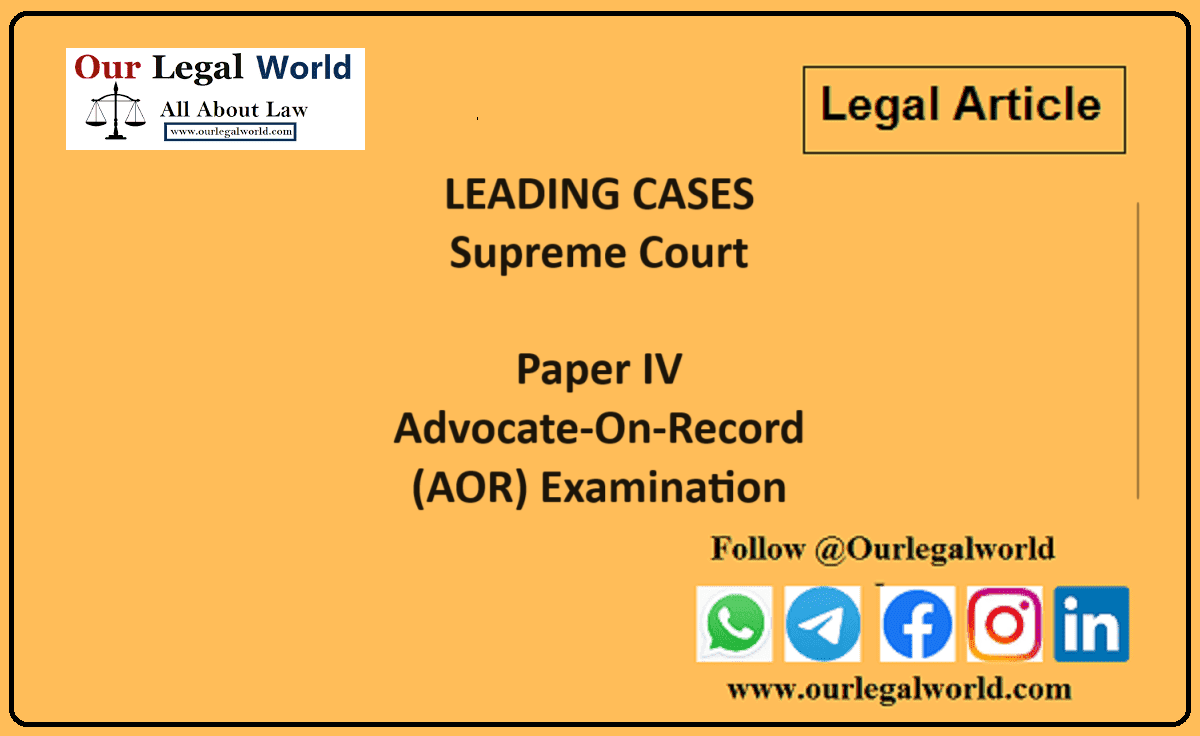Judicial Separation under Hindu Marriage Act, 1955
INTRODUCTION
Marriage is considered as an unbreakable tie between husband and wife. However, at times it is difficult to adjust in a relationship. Similarly, marriage can also come to an end. No remedy for such failure was provided earlier. Whereas, with the emergence of Hindu Marriage Act, 1955 the situation changed. The parties have a remedy to it through Judicial Separation or Decree of Divorce. Though the grounds provided for both are same but there is a difference between both.
Judicial Separation gives a chance to the parties to understand and continue the marriage under Section 10 of the Hindu Marriage Act, 1955. Whereby, under Section 13 of the Act, divorce puts an end to the marriage.
JUDICIAL SEPARATION
Section 10(1) provides that either husband or wife can file for a decree of judicial separation on any of the grounds as mentioned by law. These grounds are discussed under Section 13(1) of the Hindu Marriage Act, 1955. Also, few additional grounds are mentioned particularly for wife under Section 13(2) of the Act. However, a decree of Judicial Separation does not amount final end of the marriage. It only frees the party from marital obligations. However, the parties still have an option to continue the marriage and the decree shall have not any effect over it. Most importantly, the marriages are not free to remarry unless their previous marriage is not dissolved.
The grounds as followed by either party for the decree of Judicial Separation are discussed as follows-
-
Adultery (Section 13(i))
If the opposite party involves in voluntary sexual intercourse with someone other than his or spouse after solemnization of marriage shall amount to adultery. Even a single act of adultery gives the opposite party a chance for relief. This expression of ‘adultery’ was replaced by ‘living in adultery’ (earlier) by Marriage Laws Amendment Act, 1976.
Court stated that circumstances must be so compelling that the only irresistible conclusion can be adultery.[1] Also, if an unrelated person is found with wife after midnight be conferred as adulterous act.[2] Whereas, the Court even faced dilemma where the question was raised a to whether Artificial Insemination Drug being used by the wife without consent of husband can be ruled as adulterous.[3]
-
Cruelty (Section 13(ia))
When either of the spouse a bad behavior towards another amounts to cruelty. This cruelty includes mental as well as physical cruelty. However, the Court stated that at times it is possible that there may be presence of any one type. Existence of physical and mental cruelty at a time is not mandatory. The term cruelty is not defined anyone and totally depended upon the facts and circumstances of the case.
However, Supreme Court held that the word “cruelty” is used in Section 13(1)(i)(a) of the Act in the context of human conduct or behavior in relation to or in respect of matrimonial duties or obligations. Physical violence is not absolutely essential to constitute cruelty. A consistent course of conduct inflicting immeasurable mental agony and torture may constitute cruelty. Mental cruelty may consist of verbal abuses and insults by using filthy and abusive language leading to constant disturbance of mental peace of the other party. Hence, Supreme Court set aside the judgment of the High Court and directs that the marriage between the parties should be dissolved according to the provisions of the Hindu Marriage Act, 1955.[4]
-
Desertion (Section 13(ib))
If either party has deserted the petitioner for continuous period of two years then his or her spouse can file a petition for judicial separation. The term desertion means to desert the other party without any sufficient cause. A wife may file a case on ground of adultery without any other qualifying offence such as cruelty or desertion.[5] When a petition is filed the petitioner is expected to prove intention through conduct as person’s mind cannot be read.[6]
-
Conversion (Section 13(ii))
If one party converts from Hindu to any other religion then his or her spouse has an option to file a petition under Section 10. It is to be noted that conversion does not give chance to the converted party to file the petition.
-
Unsound Party (Section 13(iii))
Where either of the party is suffering from a mental disorder to an extent that petitioner cannot live with other party. However, it is important to prove that the respondent is of unsound mind. The term ‘metal disorder’ means mental illness, arrested or incomplete development of mind, psychopathic disorder or disability of mind, and includes schizophrenia.
-
Virulent (Section 13(iv))
Another term used is leprosy. If the spouse is suffering from leprosy then a petition for Judicial separation can be filed thereby.
-
Venereal Disease (Section 13(v))
If the party is suffering from venereal disease that be communicable in form then other party can obtain the relief.
-
Renounced the world (Section 13(vi))
If the spouse enters into the leaves the worldly affairs and enters any religious believes only. It is believed to be civil death and provides relief for judicial separation to other party.
-
Presumed death (Section 13(vii))
This refers when spouse is missing since past seven years continuously and neither of his or her friends, relatives or any other person possible is aware about his existence or has not been heard alive.
Further, Section 13(2) of the Hindu Marriage Act, 1955 provides various grounds for wife to file a decree of judicial separation against the husband.
-
Bigamy (Section 13(1A))
Wherein husband has more than one wife living. It is to be noted, that if the husband has married before the commencement of the Act and after this, he has remarried again then such a petition can be filed. Provided that the other wife must be alive during the presentation of petition.
-
Rape, Sodomy or Bestiality (Section 13(2)(ii))
If the husband has committed an offence like rape, sodomy or bestiality then the wife can take the relief.
-
Option of Puberty (Section 13(2)(iv))
If the marriage of women was done at a younger age and the marriage was solemnized before the age of fifteen, then once she attains the age of fifteen, she holds an option to repudiate the marriage before attaining the age of eighteen.
Also Read: VOID AGREEMENT UNDER SECTION 24 to 30 OF INDIAN CONTRACT ACT, 1872
-
Non-resumption of Cohabitation
If the court has passed a decree for maintenance and ever since the parties have not cohabited together for a continuous time span of 1 year then the wife seek judicial separation[7] under Section 18, Hindu Adoption and Maintenance Act.
WHERE TO FILE PETITION?
The petition for decree of judicial separation can be filed in District Court of the place-
- Where marriage was solemnized
- Respondent resides
- Parties last resided together
- Petitioner resides (under special circumstances)
WHY IS JUDICIAL SEPARATION CONSIDERED BETTER THAN DIVORCE?
- It provides party an option to continue the marriage.
- It does not put a final end to the marriage.
- It helps to prevent the decisions made hastily out of human anger or any other issues.
- Failure of non-resumption gives an option to file suit for decree of divorce.
- Gives the parties their personal space regarding the conjugal rights and time to rethink.
Importantly, if the husband tried to force his wife for the act of physical relationship then it can amount to rape. For this act of husband, he can be held liable under Section 376(A) of Indian Penal Code where he shall be punished with imprisonment that may extend up to a period of two years and fine. Mere passing the decree does not end the marital status of parties.[8]
CAN PARTIES RESUME COHABITATION LATER?
If the party wish to cohabit together then they are free to do so. The decree passed is judgement in rem and thus do not require to necessarily get order of judicial separation annulled by the court. However, Section 10(2) gives power to Court to rescind the decree for judicial separation if it seems fit and reasonable. Where a party failed to establish that there exist grounds for obtaining divorce, the decree of judicial separation will not be granted.[9]
However, during the time of separation, a wife can claim maintenance from her husband if she fails to maintain herself.[10] Also, it is not important that husband and wife have to reside at different places. However, the apex Court certainly decided that there is no necessity of presence of proof beyond reasonable doubt where persona relationships are involved especially those between husband and wife.[11]
CONCLUSION
Judicial separation is just a step before the divorce. It provides the parties to rethink and solve the grudges between them. However, if the issues seem to be serious then the parties have the option to bring the marriage to an end by filing for a decree of judicial separation. Whereas, resumption of cohabitation can even be made with the mutual consent and understanding of the parties. A decree of judicial separation requires sufficient evidence so as to pass the decree.[12] These relieve were not provided before 1955. They came into existence after the legislation was formed in Hindu Law. These were provided to provide a better life to the party who is actually suffered by the existence of marriage. At times, it is also possible that a decree of divorce be converted to a decree of judicial separation if the court deems it reasonable.[13]
REFERENCES
- [1] Banchanidde v. Kamladas
- [2] Subbarma v. Saraswathi
- [3] Maclenna v. Maclenna
- [4] Naveen Kohli v. Neelu Kohli
- [5] Ammini E.J. v. Union of India
- [6] K.C. Sikroni v. Sarla Sikroni (1989)
- [7] Gomathi v. Kumargurrupaan
- [8] Narasinmha v. M. Boosamma
- [9] Menthena Siromani v. M. Venkateshwar Raju
- [10] Sohan Lal v. Kamlesh
- [11] Dastane v. Dastane
- [12] Sulekha Bairagi v. Prof. Kamala Kanta Bairagi
- [13] Chandra v. Suresh (1971)







![Tax Law Internship at Legum Attorney [Chamber of Ashish Panday], Delhi : Apply by 15th May 2025](https://www.ourlegalworld.com/wp-content/uploads/2025/05/IMG_0113-min.png)

